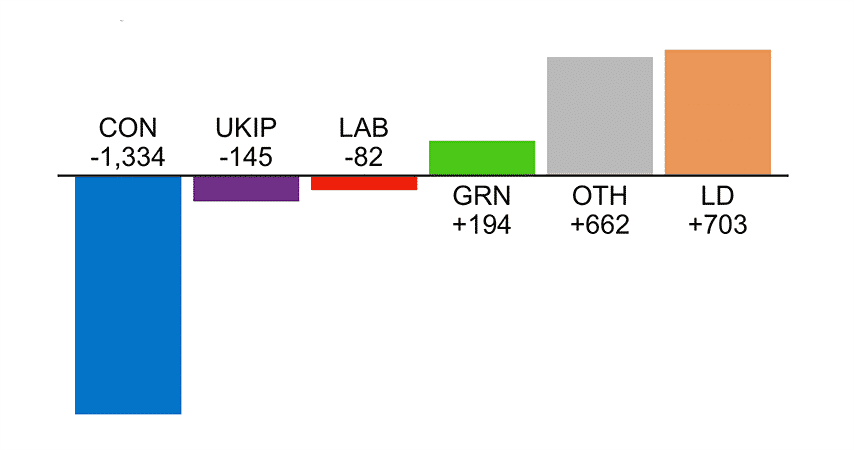

By Bernie McAdam
The local election results were a disaster for the Tories with the loss of 44 councils and 1,330 councillors. Labour’s performance was disappointing with the loss of six councils and 84 councillors – well below John McDonnell’s expectant 400 gains.
The media hardly noticed the difference between Labour and Tory results as they branded them all poor and deduced that Labour lost ground in Leave areas. This is of course rubbish. Tory losses were of a far greater magnitude than Labour’s. Brexit obviously featured in voters’ intentions but Labour made losses and gains in both Leave and Remain areas.
Labour did well in the south and even took control of Gravesham in Kent, a big Leave area. In the north Labour didn’t do so well but this was not mainly Labour Leave voters deserting for UKIP. UKIP lost 145 councillors. More likely, as Bridget Phillipson MP for Sunderland, where Labour lost 10 seats, suggests, “it was because the Labour vote went off to the Greens, Lib Dems or stayed at home rather than turning to the far right”.
The national pattern seems to be that both Labour and Tory, parties that wanted to do a deal to leave the EU, saw votes they had previously gathered go elsewhere to parties that want to remain. So the idea that the electorate was sending a message to Labour to “get a deal done”, as Jeremy Corbyn suggested, is totally wrong.
Labour is clearly trying to satisfy both its Leave and Remain supporters, risking the alienation of both. As a result it tried to shift the emphasis onto the cuts in local government funding in the elections, no doubt remembering its strong anti-austerity message in the General Election. It didn’t work this time. The political situation now is quite different after three years of chaotic Brexit negotiations constantly in the headlines.
Cuts bite back
Labour’s ploy backfired as Remain voters gave Labour a bloody nose. But it backfired for another crucial reason. Labour councils have faithfully implemented the Tory cuts, fearful of breaking the law by overspending, so it appears for all to see that Labour is not fighting austerity. The consequence of cutting services and making working people’s lives poorer is not unconnected to the fact that over 600 Independents and smaller parties gained councillors.
Local elections are also about local issues. Independents took control of councils, for example, in Bolsover, Derbyshire and Ashfield in Nottinghamshire. Both were Labour strongholds. Independent councillors were organised as groups and won their appeal from largely local problems. One independent councillor in Ashfield explained their success as, “a gap between council and local support offered”. In other words, Labour cutting in already deprived areas.
The problem stems from the local government policy adopted by Jeremy Corbyn, John McDonnell and Jon Trickett in 2015, when they wrote to all party members saying they did not support illegal, i.e. no cuts budgets. Instead a national campaign (which we have never seen) was to place the blame on Tory central government cuts. However, while those cuts were real – 50 per cent on average – people don’t forgive the administrator of poison just because someone else made the poison.
So some on the left of the party, like economist Grace Blakeley and Novara Media editor Ash Sarkar, promoted the Preston model as the answer: doing more with less, and doing it locally. By making local businesses preferred bidders for council contracts, subsidising workers’ co-operatives and setting up a bank to specialise in loans to small businesses, it hopes to keep council money circulating locally. A form of trickle-down economics.
This is essentially a petit bourgeois programme, protecting native suppliers against the winds of the national (and global) marketplace. But the working class will pay for this through higher costs. Moreover if it is copied widely, let alone when the next recession hits, then many of the benefits will fall away, as other markets are shut out, co-ops fail and the “people’s bank” calls in debts or folds.
Moving forward
If we are to maintain or even regain the momentum created by Corbyn’s anti-austerity drive, then Labour has to address two key dilemmas. Firstly it has to come clean on the consequences of any form of Brexit deal. Quite apart from the economic disaster looming for working class people and their living standards, there will be a poisonous political climate of nationalism and racism driven by the far right. Labour should oppose to this divisive narrative – and oppose Brexit.
Secondly Labour should put its stand against local government funding cuts into action and call on its councillors and the trade union movement to defy the Tories. Instead of presiding over cuts or protecting local small businesses at the expense of others and consumers, Labour councils should pass no cuts budgets and involve service workers and users to draft “needs budgets”. It should welcome resistance to the Tories, including the use of industrial action against the cuts, and also commit a future Labour government to reinstating all the Tory cutbacks.